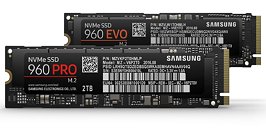- Joined
- Oct 9, 2007
- Messages
- 47,511 (7.49/day)
- Location
- Hyderabad, India
| System Name | RBMK-1000 |
|---|---|
| Processor | AMD Ryzen 7 5700G |
| Motherboard | ASUS ROG Strix B450-E Gaming |
| Cooling | DeepCool Gammax L240 V2 |
| Memory | 2x 8GB G.Skill Sniper X |
| Video Card(s) | Palit GeForce RTX 2080 SUPER GameRock |
| Storage | Western Digital Black NVMe 512GB |
| Display(s) | BenQ 1440p 60 Hz 27-inch |
| Case | Corsair Carbide 100R |
| Audio Device(s) | ASUS SupremeFX S1220A |
| Power Supply | Cooler Master MWE Gold 650W |
| Mouse | ASUS ROG Strix Impact |
| Keyboard | Gamdias Hermes E2 |
| Software | Windows 11 Pro |
Cashing in on the popularity of its "EVO" brand extension in the client SSD space, Samsung this September announced the 960 EVO family of PCI-Express SSDs in the M.2 form-factor, supporting the NVMe protocol. The drives are up for pre-order on the company's US online store. The series is topped with the 1 TB variant, priced at USD $479.99, followed by the 500 GB variant priced at $249.99, and the 250 GB variant priced at $129.99.
All three variants target a price-per-GB value around the $0.50/GB mark, however, one has to note that these are PCI-Express drives. The cheapest 250 GB variant serves up sequential transfer speeds of up to 3200 MB/s reads, with up to 1500 MB/s writes; the 500 GB variant up to 1800 MB/s writes; and the 1 TB variant up to 1900 MB/s writes. All three drives feature 3D V-NAND flash memory by Samsung, while the controller takes advantage of PCI-Express gen 3.0 x4 interface over the M.2-2280 form-factor, taking advantage of the NVMe protocol.

View at TechPowerUp Main Site
All three variants target a price-per-GB value around the $0.50/GB mark, however, one has to note that these are PCI-Express drives. The cheapest 250 GB variant serves up sequential transfer speeds of up to 3200 MB/s reads, with up to 1500 MB/s writes; the 500 GB variant up to 1800 MB/s writes; and the 1 TB variant up to 1900 MB/s writes. All three drives feature 3D V-NAND flash memory by Samsung, while the controller takes advantage of PCI-Express gen 3.0 x4 interface over the M.2-2280 form-factor, taking advantage of the NVMe protocol.

View at TechPowerUp Main Site







